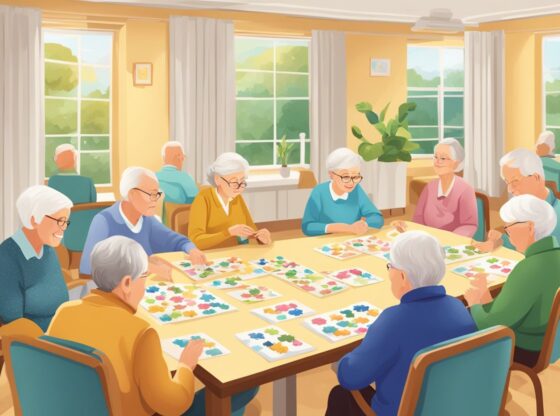Activities for seniors with dementia can be a valuable tool in improving their quality of life. Dementia is a disorder that affects memory, thinking, and behavior. As a result, seniors with dementia may experience isolation, depression, and anxiety. Engaging in activities can help stimulate their minds, improve their mood, and provide a sense of purpose.
Characteristics of activities for seniors with dementia are different from those for other age groups. Seniors with dementia may have difficulty with communication, comprehension, and motor skills. Therefore, activities should be simple, enjoyable, and easy to follow. They should also be tailored to the individual’s interests and abilities.
Types of activities for seniors with dementia can include physical, mental, and social activities. Physical activities can help improve mobility, balance, and coordination. Mental activities can help improve memory, cognition, and problem-solving skills. Social activities can help improve communication, interaction, and emotional well-being. Loved ones should accompany these activities providing support, encouragement, and companionship.
Table of contents
Key Takeaways
- Activities can help improve the quality of life for seniors with dementia.
- Activities should be simple, enjoyable, and tailored to the individual’s interests and abilities.
- Physical, mental, and social activities can be beneficial, and loved ones should accompany the activities to provide support and companionship.
Characteristics of Activities for Seniors with Dementia
Activities for seniors with dementia should be carefully chosen and tailored to their needs. Consideration should be given to the following characteristics:
Simplicity
The activities should be simple and easy to understand. Complex activities can cause confusion and frustration, leading to agitation and anxiety. Simple activities such as sorting objects or playing with sensory toys can be calming and enjoyable.
Familiarity
Activities that are familiar to the senior can help to reduce confusion and anxiety. Activities that involve familiar objects or routines can be comforting and reassuring. For example, listening to music from their youth or looking at old photos can be a source of joy and comfort.
Safety
Safety should always be a top priority when selecting activities for seniors with dementia. Activities that involve sharp objects, heavy lifting, or other potential hazards should be avoided. Instead, focus on activities that are safe and enjoyable, such as walking, light exercise, or playing games that do not involve physical contact.
Engagement
Activities should be engaging and stimulating. Seniors with dementia may have difficulty initiating activities on their own, so it is important to provide them with opportunities for engagement. Activities that involve social interaction, such as group games or art classes, can be particularly beneficial.
Flexibility
Activities should be flexible and adaptable. Seniors with dementia may have good days and bad days, and their abilities may change over time. It is important to have a variety of activities available that can be adapted to meet their changing needs and abilities.
In summary, activities for seniors with dementia should be simple, familiar, safe, engaging, and flexible. By considering these characteristics, caregivers can provide meaningful and enjoyable activities that can improve the quality of life for seniors with dementia.
Types of Activities for Seniors with Dementia
Cognitive Activities: Stimulating Brain and Memory
Cognitive activities are designed to stimulate the brain and memory of seniors with dementia. These activities can help improve cognitive function and reduce the risk of further cognitive decline. Some examples of cognitive activities and memory activities for adults include:
- Crossword puzzles and word games
- Memory games and puzzles
- Reading and discussing books
- Playing card games and board games
- Engaging in conversation and storytelling
Sensorial Activities: Keeping Senses Alive
Sensorial activities are designed to keep the senses of seniors with dementia alive. These activities can help maintain a connection to the world around them and provide a sense of comfort and familiarity. Some examples of sensorial activities include:
- Listening to music or singing songs
- Smelling familiar scents or aromatherapy
- Touching different textures and materials
- Tasting different foods and flavors
- Looking at photo albums or artwork
Activities to Explore Creativity
Engaging in creative activities can help seniors with dementia express themselves and explore their creativity. These activities can provide a sense of accomplishment and enjoyment. Some examples of creative activities include:
- Painting or drawing
- Crafting and DIY projects
- Writing or journaling
- Gardening or nature walks
- Playing music or singing
Social Activities
Social activities are designed to promote social interaction and connection among seniors with dementia. These activities can help reduce feelings of isolation and loneliness. Some examples of social activities include:
- Attending community events and outings
- Participating in group exercise classes
- Joining a book club or discussion group
- Volunteering or participating in charity events
- Spending time with family and friends
Overall, there are many different types of activities that can benefit seniors with dementia. By incorporating a variety of activities into their daily routine, seniors can improve their cognitive function, maintain their senses, express their creativity, and stay socially connected.
How Do You Keep Seniors With Dementia Engaged in Activities?
When it comes to engaging seniors with dementia in activities, it’s important to remember that each person is unique and may respond differently to various activities. However, there are a few general tips that loved ones can follow to help keep their seniors engaged and interested in the activities.
One important tip is to choose activities that are familiar to the senior. This can include activities that the senior enjoyed in the past, such as gardening, cooking, or listening to music. Familiar activities can help seniors feel comfortable and confident, which can in turn help them engage more fully in the activity.
Another tip is to keep the activities simple and easy to understand. Seniors with dementia may have difficulty following complex instructions or multi-step activities. By choosing simple activities, loved ones can help ensure that the senior is able to fully participate in the activity and feel a sense of accomplishment.
It’s also important to be patient and flexible during the activity. Seniors with dementia may need extra time to complete tasks or may become distracted or disinterested in the activity. Loved ones should be prepared to adjust the activity as needed to help keep the senior engaged and interested.
Finally, loved ones should be sure to provide plenty of encouragement and positive feedback throughout the activity. Seniors with dementia may feel frustrated or discouraged if they are struggling to complete a task. By providing positive feedback and encouragement, loved ones can help boost the senior’s confidence and make the activity more enjoyable for everyone involved.
Bottom Line
In summary, there are various activities for seniors with dementia that can improve their quality of life and overall well-being. Engaging in physical activities such as walking, stretching, and dancing can help improve their mood, reduce anxiety, and promote better sleep.
Additionally, cognitive activities such as puzzles, board games, and memory exercises can help improve memory and cognitive function. Seniors with dementia can also benefit from sensory stimulation activities such as listening to music, smelling different scents, or feeling different textures.
It is important to note that not all activities may be suitable for every senior with dementia. It is recommended to consult with a healthcare professional or a specialist to determine which activities are appropriate for an individual’s specific needs and abilities. Incorporating a variety of theses activities into a senior daily routine can help improve their quality of life, promote independence, and provide a sense of purpose and enjoyment.
Frequently Asked Questions
Yes, there are many free resources available for dementia-friendly activities. Some examples include online resources, such as the Alzheimer’s Association website, which offers a variety of free resources and educational materials. Local community centers and libraries may also offer free activities for seniors with dementia.
To find dementia-friendly activities near you, you can start by contacting local senior centers, nursing homes, and community centers. You can also search online for resources and organizations that offer dementia-friendly activities in your area. It is important to choose activities that are appropriate for the individual’s cognitive and physical abilities, and to consider their interests and preferences.



